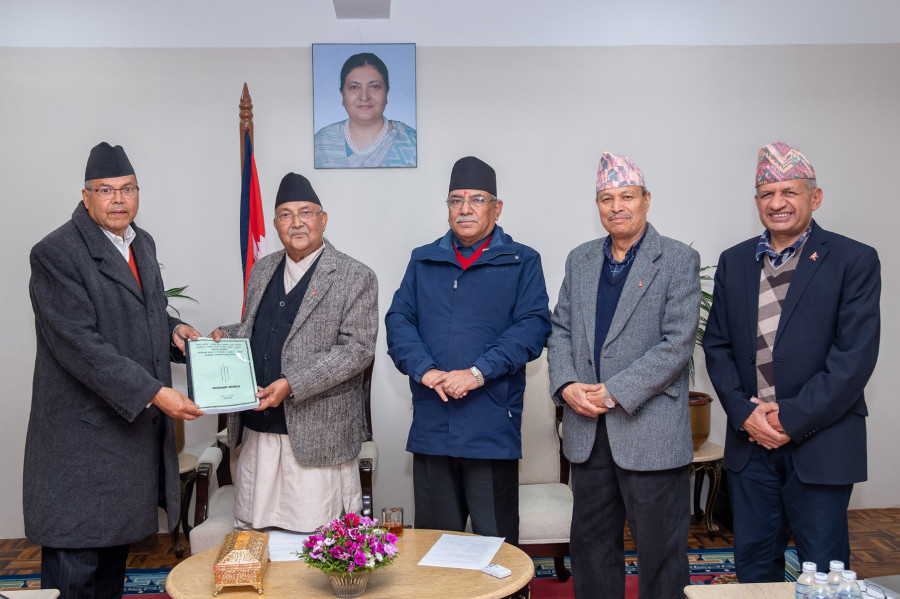National
Amending the MCC Nepal compact could violate the Vienna Convention
According to the Vienna Convention on the Law of Treaties, a treaty once signed cannot be revised later by altering its primary purpose and objective.
Binod Ghimire
The Nepal Communist Party’s three-member task force has recommended amendments to the Millennium Challenge Corporation’s Nepal Compact but legal experts believe that any significant changes to the compact could violate the Vienna Convention on the Law of Treaties.
According to the Vienna Convention on the Law of Treaties, a treaty once signed cannot be revised later by altering its primary purpose and objective.
Article 18 of the convention says, “A State is obliged to refrain from acts which would defeat the object and purpose of a treaty when: (a) it has signed the treaty or has exchanged instruments constituting the treaty subject to ratification, acceptance or approval until it shall have made its intention clear not to become a party to the treaty; or (b) it has expressed its consent to be bound by the treaty, pending the entry into force of the treaty and provided that such entry into force is not unduly delayed.”
Both Nepal and the United States are signatories to the convention, even though both haven’t ratified it. However, the convention, since being enacted in 1969, has attained the status of customary international law. According to Cornell Law School’s Legal Information Institute, customary international law “refers to international obligations arising from established international practices, as opposed to obligations arising from formal written conventions and treaties.”
Following fierce opposition from a section of party leaders, the ruling Nepal Communist Party had decided to form a three-member task force to study provisions in the Millennium Challenge Corporation Nepal Compact. The task force, led by Jhalanath Khanal, in its report to the party, said that some provisions needed amendment before the MCC could be ratified by Parliament, as they could jeopardise Nepal’s sovereignty.
The panel had Bhim Rawal and Pradeep Gyawali as members. Rawal has been the most vocal critic of the $500 million US grant. Gyawali is foreign minister in the Oli government.
The compact was registered in Parliament by Finance Minister Yubaraj Khatiwada in July last year but Parliament has yet to take action on the compact due to differences within the ruling party.
Now that the task force has said that the compact cannot be endorsed in its current form, even Prime Minister KP Sharma Oli, who had appeared determined to get it endorsed through the ongoing winter session, seems convinced that some changes are required.
But legal experts do not believe that any significant amendments can be made to the compact without violating the Vienna Convention or leading the US to pull out.
“It’s not that the compact cannot be revised through mutual understanding, but its primary purpose cannot be changed,” Semanta Dahal, an advocate, told the Post.
The US Embassy in Nepal has already clarified that there is no longer any prospect for amendments to the compact.
However, the ruling party has yet to clarify what specific changes the task force recommended.
Leaders opposed to the MCC’s ratification by Parliament are demanding clarity on whether the MCC is part of Washington’s Indo-Pacific Strategy, which they say is directed at countering China. Yet another concern is with a provision that says that the compact will prevail over Nepal’s existing laws in case of conflict.
However, the compact is not the first document to have such provisions.
Nepal has received large amounts of aid from Japan through the Japan International Cooperation Agency. But according to Section 7.01 of the General Terms and Conditions for Japanese Grant, which sets the general terms for all grants received by countries through JICA, “The validity, interpretation and performance of the agreement shall be governed by the laws and regulations of Japan.”
As far as the MCC being part of the Indo-Pacific Strategy is concerned, the US has repeatedly made it clear that everything that the US does in the region is part of the Indo-Pacific Strategy. Various visiting US officials have even said that the Indo-Pacific Strategy is not something any country can join or be a part of. But a bullish section of the ruling party remains suspicious, as they believe the strategy is largely aimed at countering China and the MCC is a bid to countervail Beijing’s Belt and Road Initiative, which Nepal signed up to in 2016.
Legal experts say the ruling Nepal Communist Party must understand that the United States is an extremely important partner for Nepal and dragging the MCC into unnecessary controversy could sour relations between the two countries.
“There is nothing in the MCC for us to worry about,” Bipin Adhikari, former dean of the Kathmandu University School of Law, told the Post. “Demanding a revision in the compact at this point could also raise questions over the country's credibility.”
Nepal signed the MCC agreement in September 2017.
Then joint-secretary Baikuntha Aryal and Jonathan Nash, acting chief executive officer of the MCC, signed the agreement in the presence of then minister for finance Gyanendra Bahadur Karki and US Deputy Secretary of State John J Sullivan in Washington. Through the agreement, the US government agrees to provide $500 million in grants while Nepal will put in $130 million for the project that prioritises energy and roadways.
According to Adhikari, Nepal needs to be able to maintain good relationships with the US and all friendly countries.
“Antagonising any country, and in the recent case the US, can have long-term economic and diplomatic repercussions,” said Adhikari.




 16.12°C Kathmandu
16.12°C Kathmandu















